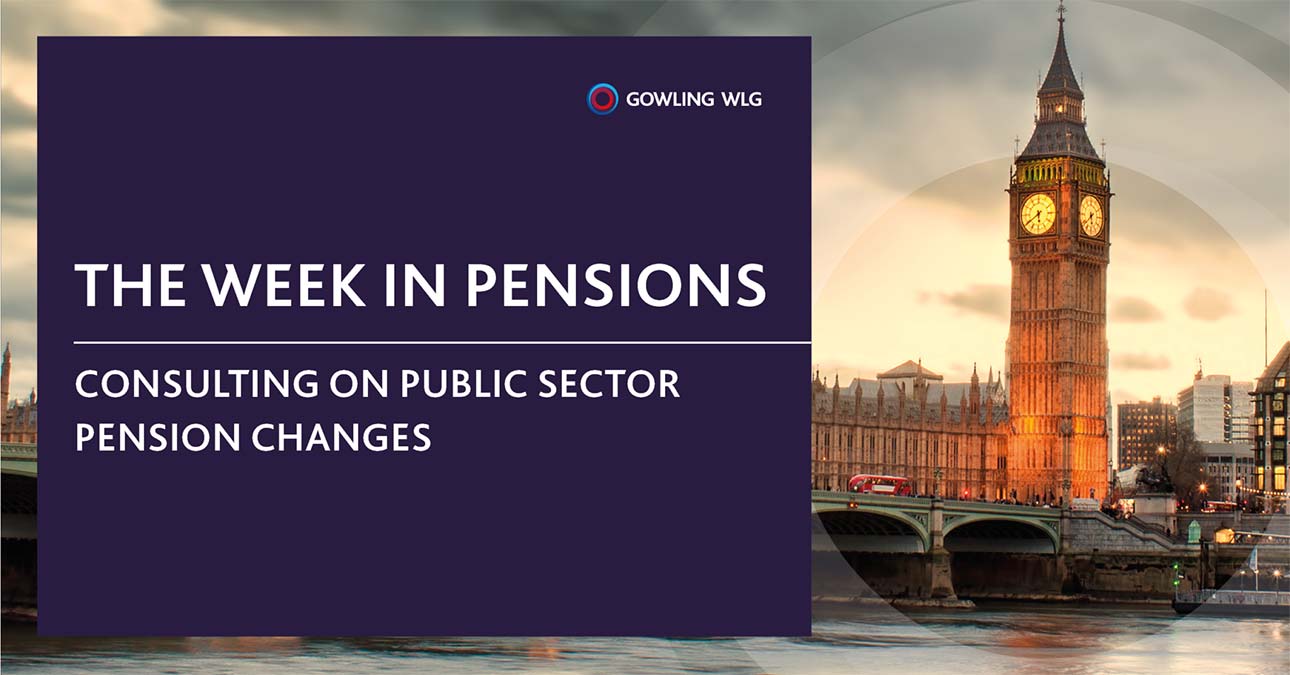Get up to speed with this week’s update on UK workplace pensions law and regulation.
Watch the video update
This weeks pensions legal and regulatory developments
Government issues three consultations on changes to public sector pension schemes
1. Consultation on proposals to remove age discrimination from the Local Government Pension Scheme in England and Wales (LGPS)
This consultation follows on from the Court of Appeal decision that found the transitional protections given to older members in the judicial and firefighters’ pension scheme directly discriminate against younger members in those schemes.
In accordance with a government commitment to remove the difference in treatment from all public service pension schemes with similar protections, the Ministry of Housing, Communities and Local Government is now consulting on proposals that would extend the LGPS statutory underpin protection to younger members of the scheme.
Specifically, the Government is proposing to remove the condition that required a member of the LGPS to have been within 10 years of their NPA on 1 April 2012 in order to be eligible for underpin protection. The consultation is asking for views on this central proposal and on supplementary changes to ensure the revised underpin “works effectively and consistently for all members” as well as on the draft regulations.
The underpin was introduced in April 2014 as part of a series of changes to the benefit structure of the LGPS.
The consultation closes on 8 October 2020.
2. Consultation on Public Service Pensions
This consultation also follows on from the Judges’ and Firefighters’ decision and aims to remedy the discrimination identified in the policy of transitional protection that was part of the 2015 reforms to public service pension schemes. HM Treasury’s consultation sets out its proposals for addressing this discrimination, together with its plans for the future.
This consultation covers the main public service pension schemes for which the UK Government is responsible and includes the Civil Service Pension Scheme, the Firefighters Pension Scheme in England, the Teachers’ Pension Scheme in England and Wales and the NHS Pension Schemes in England and Wales.
Broadly, the Government’s intention is that all members will be in reformed schemes by 1 April 2022 and that legacy schemes will then be closed to all members whilst maintaining final salary links. Members will be given a choice as to whether to accrue benefits in respect of the “relevant period” in their reformed scheme or legacy scheme (i.e. to remedy the identified discrimination).
The consultation closes on 11 October 2020.
In addition, the Government Actuary’s Department (GAD) has published a technical bulletin on public service pension schemes which sets out a useful summary of the issues around the transitional provisions that were introduced, the proposals for remedying the discrimination identified and the plans for future service provision. This is based on the update the Chief Secretary to the Treasury gave to Parliament.
3. Consultation on proposals to reform judicial pension arrangements
The third consultation follows on from the Senior Salaries Review Body’s (SSRB) Major Review of the Judicial Salary Structure back in 2018 which highlighted problems within the judiciary around recruitment and retention, attributing them in the main to the pensions changes introduced back in 2015.
In June 2019, the Government responded to the findings of the SSRB with an undertaking to develop a pensions-based solution for the whole of the judiciary. This consultation sets out that proposed solution. The aim is to have a reformed pension scheme in place by April 2022.
The consultation closes on 16 October 2020.
More information
- Click here for a link to the Consultation on proposals to remove age discrimination from the LGPS in England and Wales;
- Click here for a link to the consultation on Public Service Pensions;
- Click here for a PDF copy of the GAD Technical Bulletin on public service pensions; and
- Click here for a link to the consultation on proposals to reform judicial pension arrangements
COVID-19: government to fund AE contributions for young employees under new Kickstart Scheme
The government has announced it will be launching a new Kickstart Scheme to employ individuals aged between 16 and 24 who are on Universal Credit or “deemed to be at risk of long-term unemployment” to help the UK’s economy recover following the COVID-19 pandemic.
Under the £2 billion scheme, the government confirmed it will fund 100% of the minimum automatic enrolment employer contributions for 25 hours a week, during the six-month work placements. However, due to the minimum age eligibility for automatic enrolment, those under the age of 22 in the scheme will not be legally required to be auto-enrolled.
More information
The Pensions Ombudsman and The Pension Protection Fund Ombudsman publish their annual report and accounts
Highlights from the annual reports and accounts include:
- TPO now has 98.4 full time equivalent staff, meaning the service has doubled in headcount over the last four years;
- telephone enquiries have increased year-on-year by 41% to 11,522 and written enquiries by 24% to 8,977;
- informal resolutions have risen to 95% in 2019/20 compared to 80% the previous year;
- full scale investigations are reducing (from 1,528 in 2018/19 to 1,192 in 2019/20), in line with expectations from the introduction of the early resolution procedure;
- complaints about transfers top the list of reasons for investigations (23.6%) followed by miquotations and misinformation (14.1%), ill-health (9.8%) and administration (9.1%). The subject-matter of complaints is broadly similar to previous years;
- TPO expects an increase in complaints directly resulting from COVID-19 (including complaints relating to the furlough scheme, scams and transfers, payment of auto-enrolment contributions, pension benefit claims concerning ill health and redundancy, and delays in providing information and processing requests).
More information
TPR issues annual report and accounts highlighting increasing use of powers
The Pension Regulator’s 2019-20 Annual Report and Accounts were published last week. According to TPR, they demonstrate how TPR has driven up industry standards and safeguarded more schemes than ever. Some highlights from the report include an emphasis on the use of TPR powers including:
- a former charity chairman receiving a five-year jail sentence – the longest prison term TPR has secured (for a £250,000 fraud); and
- a firm being fined £350,000 for failing to fully comply with automatic enrolment duties.
More information
HMRC and HM Treasury publish their response to the technical consultation and draft legislation on the trusts registration
This is part of the UK efforts to transpose the EU’s Fifth Money Laundering Directive into UK law. One of the issues with the draft regulations related to the scope of the exemptions from the obligations set out. In particular, there were concerns that Relevant Life or Excepted Group life trusts were not exempt (whereas registered pension schemes were stated to be exempt).
Although the exemptions listed in paragraph 2.12 of the summary of the response are usefully wide and (as you’d expect) include HMRC registered pension schemes, there are still some gaps in the associated draft legislation, namely:
- the definitions chosen seem to leave out trusts with more than one policy (an issue which is particularly pertinent to the Relevant Life or Excepted Group Life trusts that we advise on), and trusts where the policy can pay out for more than one person, which could affect cases with children’s cover; and
- employer-settled medical benefit trusts, despite them being recognised in the consultation, and the granting of an exemption to insurance-based medical cover.
More information
Pension Schemes Bill 2019-21: Bill completes third reading stage and will progress to House of Commons “later this year”
On 15 July 2020, the Pension Schemes Bill 2019-21 received its third reading in the House of Lords. The DWP confirmed that the Bill’s second reading in the House of Commons will be “scheduled in due course”. This means that it won’t be passing into law before the summer recess. It now looks more likely that it will be October or November before the Bill receives Royal Assent.
The Week In Pensions
The Week In Pensions provides you with a digest of the most important developments in pensions law and regulation along with highlighting some of the most interesting stories from the pensions industry and national press.
You can see all editions of The Week In Pensions here.
Pensions at Gowling WLG
Find out more about the pensions team at Gowling WLG and get more detailed Insights and other great pensions content from the team on the Gowling WLG website.
About the author(s)
Ian is a London-based professional support lawyer (PSL) legal director. Ian is a member of our pensions and combined human resource solutions (CHRS) teams. He works with clients to solve their employment and pensions law issues. Ian maintains a particular focus on 'crossover' issues that benefit from his understanding of both areas of law.

